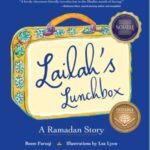Lailah’s Lunchbox: A Ramadan Story by Reem Faruqi

Published by Tilbury House Publishers in May 2015
Key Words: Change, Fears, Bilingualism, Religion, Success
Summary: Lailah has recently moved from Abu Dhabi to Peachtree City. Her mom is letting her fast this Ramadan, something that Lailah has been looking forward to doing. However, taking this step feels scary and intimidating in a new setting where no one else knows what Ramadan is, especially without her friends Hend and Ishrat. Nonetheless, she overcomes her fears and talks about Ramadan with her new teacher, and even writes a poem to educate her classmates.
Book lesson: One of the lessons is the complex process of acclimating to a new place, despite feeling out of place. Lailah’s journey illustrates the importance of being brave and sharing with your trusted group what you are experiencing, becoming bold about your identity.
Censorship: This book is banned in some states, including Florida. The author of this book even posted to display her shock and stated, “Still can’t believe Lailah’s Lunchbox is banned?! I believe the reason was “Islamic Themes” (Reem Faruqi, Instagram).
Highlights: One of my favorite portions is the description of Ramadan and its ability to explain it in a way that children can understand. Mentioning that Ramadan is not only about not eating and drinking from sunset till sundown, it is a thrilling time for Muslims all around the world, and its ability to convey this in a story manner was special.
Children’s identity: This book not only exposes children to different cultures in a beautiful way but also explains the different traditions and the difficulties that some Arab-American children might face, such as feeling different from their peers and fearing sharing their traditions with people. However, the book and Lailah’s journey teach kids that it is okay to be different and that they should not be ashamed of that, helping them develop awareness and confidence in their identity.
Sense of how others perceive us: Lailah thinks and takes into consideration how others perceive her, something that frightens her, as shown by not sharing with her teacher why she is not eating her lunch. But after confiding in a librarian at her school, she found a technique of conveying her emotions by writing down what she felt, which allowed her to overcome this fear.
Sense of Culture: The Arab-American culture is deeply ingrained in this book, presenting in a very realistic manner how many children feel. It showcases some of the traditions that people of the Muslim faith would follow, such as waking up for Sehri, and then goes on to define that at the end of the book, which I thought was very beneficial for those who might need further clarification.
Sense of Belonging/Community: Lailah has a hard time feeling like she belongs or has a community she can rely on, as she has recently moved away from her friends and feels different from others around her. However, everyone is very welcoming to her, especially her teacher, so throughout the book, this begins to improve.





